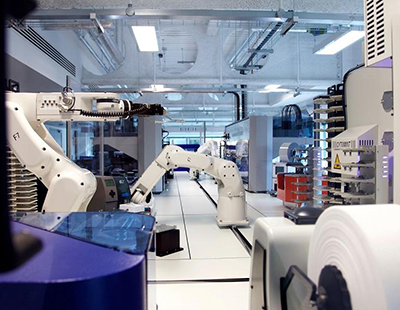Engineering biology for better global health

Taking an engineering approach to building biological systems – engineering biology – has spectacular potential to revolutionise how we diagnose and treat disease.
At the University of Edinburgh, for example, experts are working at the cutting edge of cell and gene therapies. The University is home to the most advanced, fully automated biofoundry, with Edinburgh Genome Foundry and Beacon phenotype screening.
Examples of just three of hundreds of University labs:
- Professor Susan Rosser, Edinburgh Mammalian Synthetic Biology Research Centre, is engineering ‘surveillance cells’ to search inside the body for disease biomarkers.
- Professor Andy Baker, Centre for Cardiovascular Science, is using gene and cell therapy to influence repair and regeneration of the vascular system.
- Professor Steve Pollard, Centre for Regenerative Medicine, is creating state-of-the-art stem cell modelling to tackle brain cancer.
Global spending on medicines is expected to grow to nearly $1.6 trillion by 2025, excluding spending on COVID-19 vaccines, according to the latest report by pharmaceutical company IQVIA. Seven of today’s 10 biggest-selling drugs are ‘biologics’, meaning they are based on complex protein molecules, not chemical compounds, and they require cells to manufacture them. The opportunity for impact is huge.
World leading facilities are vital to support this research. The University of Edinburgh is home to the world’s most advanced, fully automated biofoundry, the Edinburgh Genome Foundry, including the recent £2 million acquisition of Europe’s only Berkeley Lights Beacon System in an academic setting. This gives researchers the opportunity to phenotypically screen thousands of individual engineered cells.
As a research-intensive university, the importance of collaborating with industry is paramount so ideas and research will make a difference. Edinburgh Innovations, the University of Edinburgh’s commercialisation service, supports academics throughout the innovation pipeline from research to collaboration to spin out into companies.
Some examples include, SensiBile, led by co-founders Dr Sofia Ferreira-Gonzalez (CEO), Hannah Esser (transplant surgeon) and Professor Stuart Forbes (medical director), has partnered with Scottish technology integration company Integrated Graphene to develop a prototype electrochemical biosensor to help detect biliary complications’ biomarkers in donor livers.
Invizius, led by Dr Andy Herbert and his team in the University of Edinburgh’s School of Chemistry, is developing its H-Guard Haemodialysis Priming Solution, involving a novel protein that lines the inside of the dialysis filter and helps dialysis to take place undetected by the body’s immune system.
And Resolution Therapeutics, co-founded by Professor Stuart Forbes of the Centre for Regenerative Medicine and Professor John Campbell of the Scottish National Blood Transfusion Service, is developing macrophage cell therapy to treat advanced liver disease.
For businesses interested in partnering, Edinburgh Innovations will provide support and funding to help you deliver industry-academic collaborations and offers up to £25,000 matched-funding vouchers using the Beacon system.
Deliver your mammalian engineering biology project with £25,000 from the University of Edinburgh.
Contact Dr Emma Elliott to start working together.



